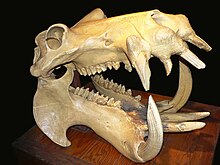Talk:QI (H series)
This article was nominated for deletion. Please review the prior discussions if you are considering re-nomination:
|
I query whether the description of Robert Webb's participation for episode five "hypnotism" should read "first and only appearance" unless it can be supported by evidence that he will never appear again. Otherwise, this is a presumption, and perhaps should read just "first appearance"
The amount of teeth a hippo has[edit]
In the fifth episode (Hanimals), they claim that hippos have four teeth. That should be noted as an error. One that could be corrected, just looking in the mouth of a hippo:


— Preceding unsigned comment added by ZarlanTheGreen (talk • contribs) 09:02, 6 January 2011 (UTC)
Sound[edit]
The idea that a tree might not make a sound when it falls is totally ridiculous. "A tree falling in the forest may or may not make a sound, depending on if one asks a semanticist or a neurologist." Sound is a physical phenomenon (1) involving the compression and rarefaction of air molecules. Sound waves, like all waves, have frequency, wavelength, amplitude, intensity, speed... and perhaps most importantly, sound waves transmit energy. To claim that sound energy is only transferred in the presence of a listener (semanticist or not) is several shades of absurd.
No it is not absurd because it depends on your interpretation of the word 'sound'. What happens when, e.g. a tree falls in a wood is that a shockwave is sent through the air. That itself is not sound. Sound is the subjective interpretation by the brain of shockwaves detected by the inner ear, which then sends electrical signals to the aural cortex Martyn Smith (talk) 20:54, 27 November 2011 (UTC)
False Claims About the Honey Badger in Episode 5, "H Animals"[edit]
According to the article, episode 5, "H Animals," promulgated several false and discredited claims about honey badgers:
- Honey Badgers, Mellivora capensis, are not of the same family as the European Badger, Meles meles.
- Honey Badgers attack by tearing off the testicles of an opponent.
- In particular, a Honey Badger was documented castrating a Water Buffalo.
- Honey Badgers locate beehives with the assistance of the honeyguide bird.
- Honey Badgers attack lions and hyenas.
Below are the currently verifiable facts on these topics. Unless otherwise noted, the source is Colleen and Keith Begg's fact file page on the honey badger at their website [1]. The Beggs are likely the foremost specialists on the Honey Badger alive today, having been the field researchers and principle investigators on two of the largest scale, longest term investigations of the Honey Badger in its natural environment ever undertaken:
- A three year (1996-1999) study of fifty-one Honey Badgers in Kgalagadi Transfrontier Park (then known as the Kalahari Gemsbok National Park)
- A multi-year (2003-?) study of Honey Badgers in Niassa Reserve in northern Mozambique.
For details of these and other research projects they have led or participated in see the research page at their website [2].
- Mellivora capensis and Meles meles are both members of the same family, the Mustelids. They are not members of the same genus, as their name indicates. See the taxoboxes for the Honey Badger and the European Badger.
- Aside from a circumstantial report dating from 1947, there is no verifiable account of a Honey Badger attacking an animal by ripping at its testicles.
- Although the relationship between the honeyguide bird and the Honey Badger is repeated throughout the literature, no verifiable account exists. A filmed account from the movie Animals Are Beautiful People on line at youtube.com was staged.
- Honey Badgers do not attack other animals unless for hunting or for defense. Male Honey Badger cubs are subject to fatal attack by older males, detailed in the documentary on the Begg's Kalahari research, Snake Killers: Honey Badgers of the Kalahari,but this behavior is not understood. — Preceding unsigned comment added by ScissorsMacGillicutty (talk • contribs) 10:44, 26 May 2011 (UTC)
Humans episode[edit]
In the XL version (possible the standard version too, I'm not sure, just as Stephen is introducing the topic of fossils, a female voice can be heard. It's not Jo Brand's. It seems like an editing error, like an instruction from the producer or some such. Anyone know anything about this? Anyone object if I mention this in the article? Martyn Smith (talk) 21:00, 27 November 2011 (UTC)
